The Myers-Briggs® Personality Types of the Peaky Blinders Characters
Have you ever wondered if you’re more of a Tommy Shelby or a Polly Gray? In today’s article we’ll help you find out!
My husband and I have been making our way through the Peaky Blinders series for several months now, and I love how well they develop the characters and put them in situations that bring out their best and their worst. Peaky Blinders isn’t a show for fans of morally black and white characters; everyone’s firmly in the gray area on the streets of BIrmingham. The characters you love will do terrible and wonderful things. You’ll have your heart broken for the characters at some points, and then shake your head wondering why they’re doing something absolutely horrible the next minute.

Of course, I can’t sit across from any of these characters and conduct a thorough type consultation (and I might be a little intimidated to do so, to be honest). All I can do is assess their perspectives and decision-making styles in the series, and make an educated guess about their Myers-Briggs® (MBTI) types. But, as always, there’s a much larger chance of being wrong when typing fictional characters.
Keep in mind: Not every Myers-Briggs® personality type is represented in Peaky Blinders. When people create TV series they don’t make it a point to include all 16 types. Your type may be missing from this list, and that is not a mistake, there just wasn’t a character who had clear preferences for that personality type.
Not sure what your personality type is? Take our new personality questionnaire here. Or you can take the official MBTI® here.
Table of contents
- The Myers-Briggs® Personality Types of the Peaky Blinders Characters
- Thomas Shelby – ENTJ
- Arthur Shelby – ESFP
- Polly Gray – ESFJ
- Michael Gray – INTJ
- John Shelby – ESTP
- Ada Thorne – ISFP
- Alfie Solomons – ENTP
- Chester Campbell – ESTJ
- Grace Burgess – ISFP
- Finn Shelby – ISFP
- Oswald Mosley – ENTJ
- Linda Shelby – ISFJ
- Freddie Thorne – ENFP
- Aberama Gold – ESTP or ENTP
- Johnny Dogs – ESFJ
- Luca Changretta – ISTP
- Charlie Strong – ISTP
- Characters I couldn’t get a profile on:
- What Are Your Thoughts?
Estimated reading time: 24 minutes
The Myers-Briggs® Personality Types of the Peaky Blinders Characters
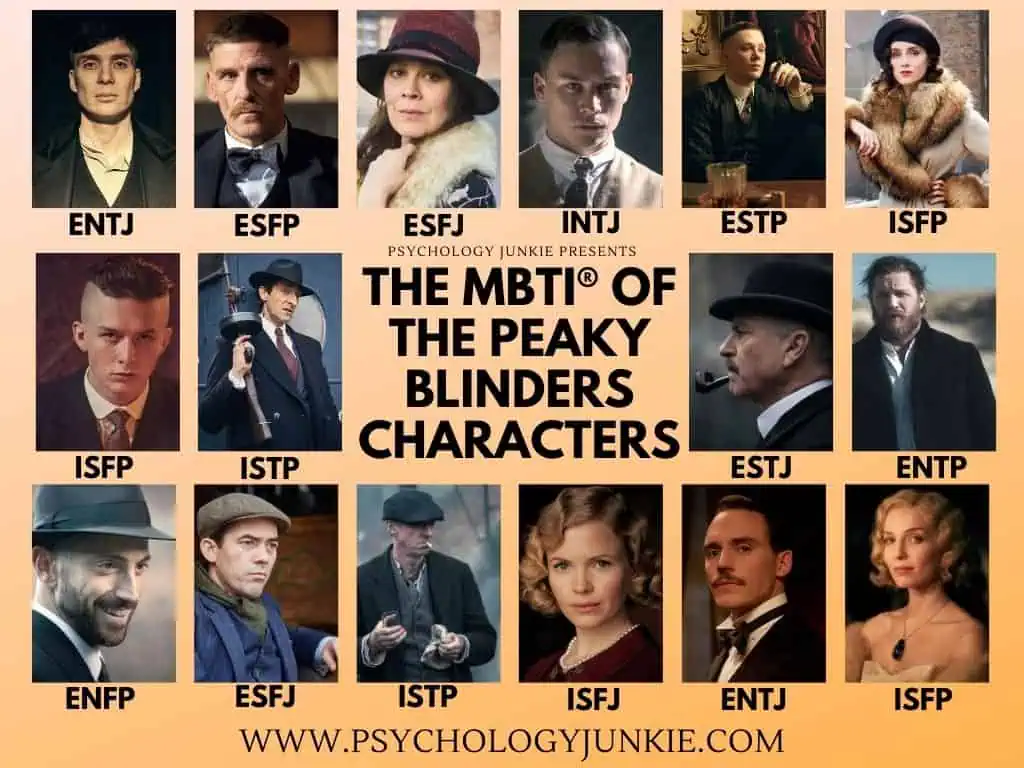
Thomas Shelby – ENTJ
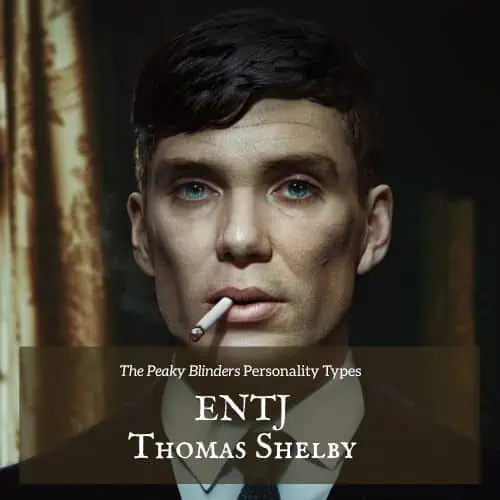
“Leadership is not a popularity contest. It’s about getting the job done.” – Thomas Shelby
Our first stop is Tommy Shelby, the leader of the Peaky Blinders. Tommy is an ENTJ. While he may appear socially introverted, he is definitely focused on the external world and is a person of action and execution. ENTJs are In-Charge™ personality types, and they do what it takes to achieve their goals rapidly and stay ahead of the game. No matter what crisis befalls the Shelby family, Tommy always has a plan or strategy in mind to get things done. I considered INTJ for Thomas Shelby for a while, but INTJs are Chart-the-Course™ personality types who need a great deal more time to come up with the “perfect” strategy. They are also more interested in internal, philosophical matters than ENTJs are. The inner world is the natural world for the INTJ, whereas the external world is the natural preference of the ENTJ.
Thomas is a person who is more fixated on achieving things in the external world than delving into the internal world. He’s quick to execute, plan, take action, and reach the next objective. He can also manage multiple strategies in different spheres with masterful finesse. No matter what emotional crisis is underway, Thomas knows how to keep a steady eye on the best rational and strategic solution. His stoic, calm, and thick-skinned demeanor is the perfect example of how an ENTJ can remain unrattled in times of stress and be a leader to other people – even when deep down they are emotionally frustrated. Of course, as the series reaches the last season we see him feeling the toll of his lifestyle more overtly.
Thomas Shelby also gives us an excellent example of the inferior Introverted Feeling (Fi) of the ENTJ personality type. He is not a man who does well with introspection and solitary leisure time. In Season 4 of Peaky Blinders he’s told to “go on vacation” and take time off. While yes, he’s grappling with the pain of PTSD, he’s also bored and irritated by not having a project to dedicate his energy towards. He does not want to dwell on his feelings or fixate on who he is as an individual entity. Rather he wants to get back in the game and make things happen. The world of competition, risk-taking, power, and action is his playground. That’s where his energy thrives.
But Tommy is not without conscience either. He highly values his family and has certain principles that pave the way for his decisions (for example, when he’s dueling with Luca Changretta, he insists no children or civilians should be harmed). We can also see that he cares about orphans, as evidenced by the homes he creates for them in Birmingham and his rough confrontation with a nun who has been abusing children. Tommy is a person, who, though he may avoid introspection, has deep convictions. Having inferior introverted feeling does not make someone emotionless and robotic. It just means that one has less certainty in the emotional terrain and is less sure of issues of identity, individuality, and who one is at a heart-level. Tommy Shelby is a richly emotional person, but he puts those emotions aside to get the job done and focus on what he believes is the overall direction for his family and his legacy.
Discover more about ENTJs: 24 Signs That You’re an ENTJ, the Director Personality Type
Arthur Shelby – ESFP
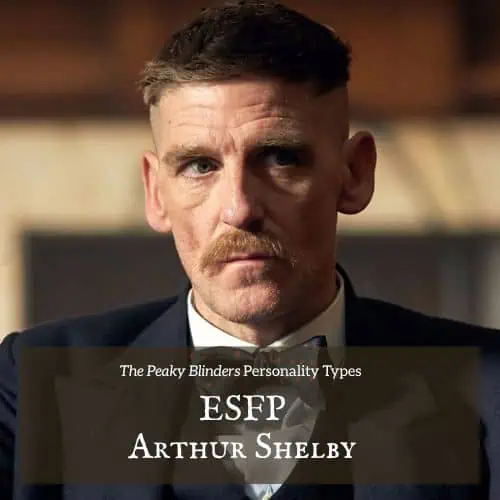
“My Heart Is A Battered Vessel, But Within, There Still Beats A Fluttering Pulse Of A Dream.” – Arthur Shelby
Arthur Shelby embodies the passion, spirit, and conviction of the ESFP personality type. The older brother of Thomas, he carries out all the “dirty work” that Tommy assigns to him. This results in a lot of inner turmoil and despair at various points in the series, as he grapples with the morality of his choices. At times, Arthur bypasses this moral conviction and focuses on living in his impulses, in the heat of the moment, and giving into hedonistic pleasures and selfish pursuits. These reckless and violent actions are his own way of coping with the pain of his war experience and the despair of not living according to his convictions.
At times Arthur is overwhelmed by the sense that he is not living according to his own ethics and is being pulled in directions that feel inherently wrong to him. This push and pull and battle that Arthur is constantly fighting with himself are characteristic of the ESFP who is struggling to find who they are in an absolutely chaotic life experience.
In the heat of the moment, ESFPs are fast to act and even faster to adapt. They have a strong sense of what will make them feel fully alive in every situation they come across, and Arthur is no exception. His action-oriented, restless nature may sometimes lead him astray, but it’s also part of why he is one of the most memorable characters in Peaky Blinders. He’s a formidable force when he’s angered, but a charming and entertaining presence when he’s in good spirits. No one wants to end up in a fight with him, but deep down he is someone who has the potential to live according to a higher calling.
Arthur is also a person who deeply cares about his family – even if it sometimes looks like he doesn’t want to take on responsibility for them. His loyalty towards the Shelby clan is unwavering and we can tell from his behavior that their welfare and success is very important to him. There are many moments where Arthur displays his values of fidelity, courage, and honor – no matter how much chaos ensues around him. There are other times, of course, when he completely loses his way.
Discover more about ESFPs: 7 Ways That ESFPs Make an Impact
Polly Gray – ESFJ
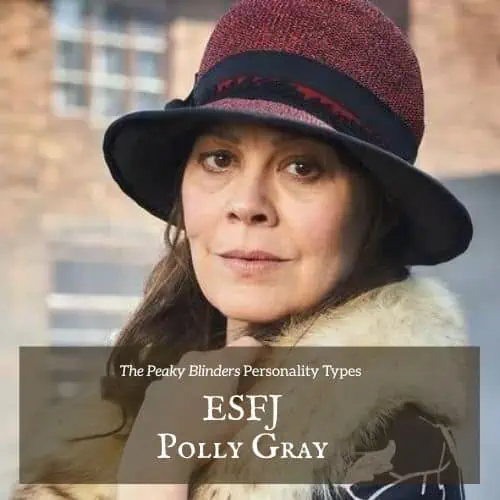
“You have your mother’s common sense but your father’s devilment. I see them fighting. Let your mother win.” – Polly Gray
The matriarch of the Shelby family, Polly Gray is a strong and resilient ESFJ character. She’s a no-nonsense woman who knows exactly how to maneuver through life and protect her family from harm. It is clear that she has an unwavering commitment to making sure that all of the Shelbys are safe and taken care of – at whatever cost necessary. This is evident in the way she takes on Tommy’s tasks for him when he is too busy or overwhelmed with other matters.
Polly makes an excellent treasurer for the Peaky Blinders due to her attention to detail and precision and pragmatism. She is the one who pays attention to the details; both financial and emotional in the family. Additionally, she has a knack for reading people and understanding what they truly need – even when they’re not willing to openly share it with her. This ability to see beyond a surface emotional level makes Polly an invaluable asset in any team or situation. This is also a key characteristic of individuals with Extraverted Feeling (Fe) at the top of their function stack (ESFJs and ENFJs).
We do see an intuitive side of Polly develop as the series progresses; but this is in large part to her history with Gypsy “magic” and spirituality than to a natural preference for Introverted Intuition (Ni). ESFJs also have an intuitive side, thanks to their tertiary Extraverted Intuition, and, especially as they reach mid-life and older, develop a penchant for conceptual thinking, connecting the dots, and exploring possibilities and theories. We can see this in Polly as she makes assessments about her family, the peers of the Peaky Blinders gang, and even the enemies they face.
Find out more about ESFJs: A Look at the ESFJ Leader
Michael Gray – INTJ
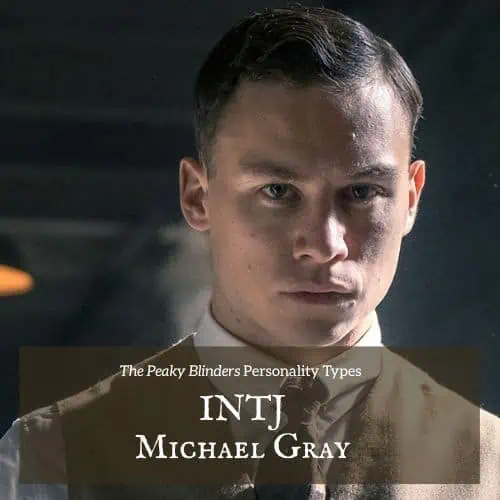
“No one close to you makes a choice without your opinion, Tom. Not Arthur, not Ada, not me. We can’t escape you. Your lethal hand is always on our shoulders.” – Michael Gray
Michael Gray is someone who values strategy, competition, and trailblazing. Taken from his mother at a young age and raised in an idyllic country setting, Michael became bored with the predictability of his life with his adopted family. He knew he needed a challenge; something that would show him what he was truly made of. When he discovers his true biological family, and sees the forces they are dealing with, he is inspired. The Peaky Blinders will be a place where he can challenge himself, make a difference, and use his natural talents.
Michael displays the diligence and seriousness of the INTJ personality type in the first few seasons, as well as their cunning nature (particularly later in the series). He is a man of few words, but his message and intent are always clear. Michael is also someone who values autonomy and independence; he does not need anyone else to validate his ideas or actions and will readily take responsibility for his own life decisions. We can see this through numerous scenes, including when he refuses to take his mothers’ orders or suggestions, or when he rebelliously speaks out against Tommy.
While Michael’s character somewhat devolves into chaos in Seasons 5 and 6, his preference for long-term strategizing and planned-out, calculated decisions is obvious. He showcases some of the best and worst characteristics of an INTJ at their best and worst.
Discover more about INTJs: 10 Things People Misunderstand About INTJs
John Shelby – ESTP
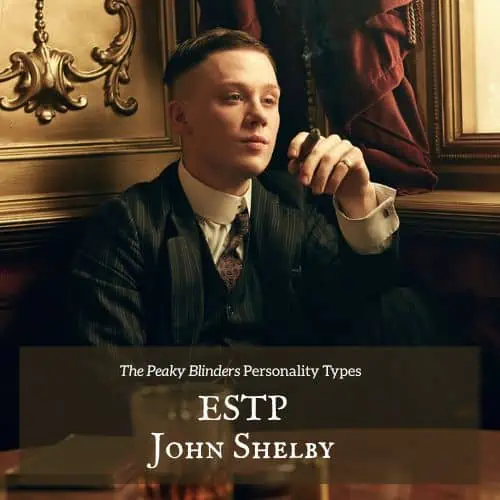
“Anyway, we’re Peaky Blinders. We’re not scared of coppers. If they come for us, we’ll cut them a smile each.” – John Shelby
Impulsive and competitive, John Shelby is an example of an ESTP who is out of touch with his moral compass. He often speaks before he thinks (as seen in several heated moments between him and Tommy) and his judgment can be volatile, to say the least. That said, John is a person of action who has tactical prowess that serves the Peaky Blinders well on the street. He is not someone you’d want for an enemy, and he’s rarely rattled in chaotic situations where his own life is on the line. John trusts his ability to react quickly, assess a situation for risk, and keep his wits about him. He also maintains a sense of humor in crisis situations; a skill that many ESTPs possess.
John also displays some of the more negative traits associated with unhealthy ESTPs, especially their tendency to be impulsive or pleasure-seeking. We often see John engaging in reckless violent behavior that can put himself (and sometimes others) at risk. He also has issues with drinking, womanizing, and getting into fist-fights over minor offenses. ESTPs at their worst can be ruled by their desire for sensory gratification and living on impulse. When unhealthy, ESTPs can lose sight of their more rational, analytical side and move from risk to risk with little eye for the logical consequences.
Find out more about ESTPs: Your ESTP Cognitive Function Guide
Ada Thorne – ISFP
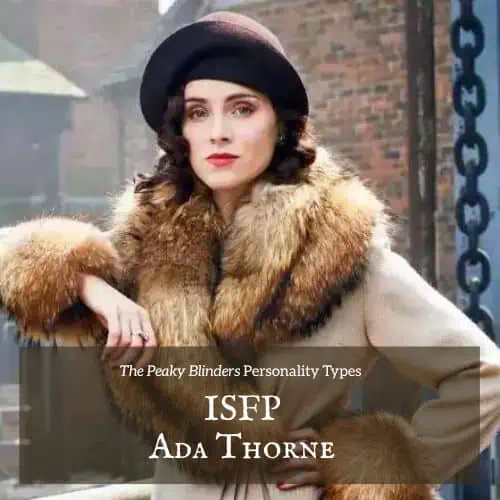
“I came back for love. And common sense.” – Ada Thorne
Ada Thorne is someone who wants to live according to her convictions – although at times those may change and fluctuate as she grows and faces different experiences. She’s determined to make her own way in life and, initially, fights against the Shelby name, wanting to forge her own path and make her own way in the world. Fierce and individualistic, Ada is led by the heart but is also guided by a healthy dose of pragmatism and common sense.
Like most Sensing-Perceivers, Ada loves to experiment with details in the outer world. For her, this shows up in her natural sense of fashion and style. Her home is exquisitely furnished and her style and makeup is always impeccable. She has an eye for detail and a desire to live each moment to the best of her ability. At the same time, she is guided by a sense of what is right or wrong for her personally. She can also sense when something doesn’t feel right for a family member, and can intuit when someone might be struggling emotionally, even when they don’t openly share it. As an example, in Season 5 when Finn takes on a violent task from Tommy, she tells him “you don’t have to prove anything to anyone.” She wants Finn to maintain his convictions and identity and not be pressured into being just like his brothers. This tendency to defend people against pressures to be someone they’re not is something that comes naturally to ISFPs.
Find out more about ISFPs: 24 Signs That You’re an ISFP, the Virtuoso Personality Type
Alfie Solomons – ENTP
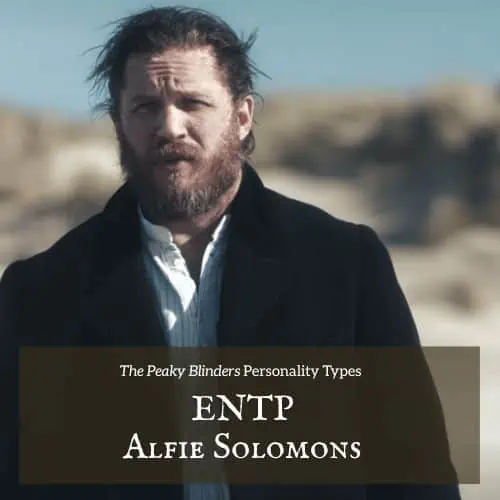
“He’ll wake up. Granted he won’t have any teeth left but he will be a wiser man for it.” – Alfie Solomons
Alfie Solomons is the classic ENTP: an inventor, entrepreneur, and master of strategy. He has a keen eye for spotting opportunities in difficult situations and can often think outside the box to find creative solutions. His wit and charm mask his cunning nature; he’s someone who can get out of any situation unscathed, even if it means sacrificing someone else’s well-being in the process.
Like many ENTPs, Alfie has a sense of humor and a rambling, talkative nature. He loves to joke and is a masterful storyteller, weaving in anecdotes from his past that may or not be entirely true. Alfie also displays the ENTPs tendency toward risk-taking; he’s willing to take chances in order to reach his goals, even when those risks could potentially backfire on him. He sees the bigger picture and understands that sometimes taking calculated risks can lead to even greater rewards.
Alfie’s unconventional mannerisms, strategies, and style speaks to his extroverted intuitive nature. He is someone who can quickly connect the dots and figure out an underlying strategy or manipulation that is in play. We can see this when he effectively “trolls” Luca Changretta in order to discover his true plan. We can also see Alfie’s tertiary extraverted feeling in the way he knows just which buttons to press emotionally for someone. He frequently steps on peoples’ emotional triggers in order to figure out an underlying principle or truth. He trusts his ability to manipulate and coerce, but can also speak inescapable and radical truths during the right moment.
Discover more about ENTPs: The ENTP Dark Side
Chester Campbell – ESTJ
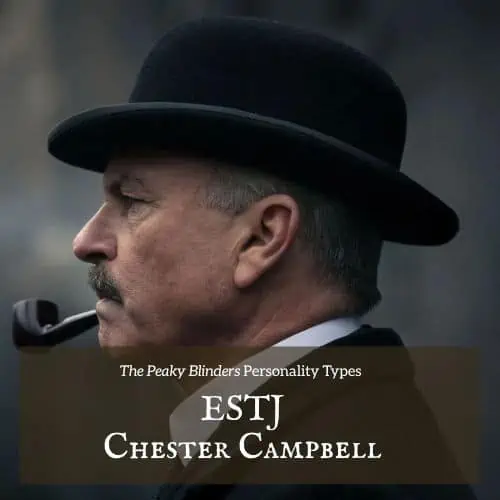
“I find the obvious vices the easiest to resist. It’s the sneaky little obscure ones that bring you to your knees.” – Chester Campbell
Campbell is an example of an ESTJ who is deeply out of touch with moral consistency. He speaks with a clear-cut sense of certainty and knows what he wants to accomplish – usually utter justice in the name of “law and order”. Of course, he doesn’t mind bending the rules when it comes to his own aims and gradually disintegrates morally as the series progresses. He takes his job seriously, but also recognizes where there are blurred lines or grey areas.
As an ESTJ, Campbell relies on facts and procedure but suppresses his emotional responses only for them to simmer up in negative ways later on. He is often cold and stoic when carrying out tasks that require logical thought and reasoning rather than empathy or intuition. His preference for structure makes him a powerful leader who can assess situations quickly, take decisive action, and manage logistics effectively. But at his worst, Campbell can become rigid and oppressive when it comes to getting what he wants – whether that be Grace Burgess’s love or Tommy Shelby’s demise. He overlooks many ethical dilemmas because he believes that, in the end, he does maintain the moral high ground as a “man of the law.”
Grace Burgess – ISFP
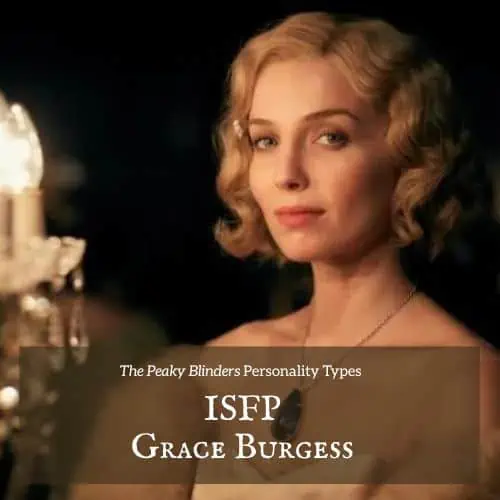
“May you be in heaven a full half-hour before the devil knows your dead.” – Grace Burgess
Grace Burgess marches to the beat of her own drum and is deeply driven by her convictions. Private and mysterious, she doesn’t let on much about herself for a long while. Like most ISFPs, she has a calm, enigmatic quality that makes people curious about her. When she firsts takes a job as an undercover spy in Birmingham, she does so to avenge her father. But over time she starts to see the humanity in the people that the law painted as unforgivable. Like many Introverted Feeling types, Grace knows that everyone has darkness. But that doesn’t mean that anyone is irredeemable.
Grace is a good listener who absorbs and processes information on her own terms. She doesn’t need affirmation from anyone else and usually lives by a personal code of ethics that she has internalized. She also leans into her Sensing preference, observing the world around her with an eye for detail and unlocking secrets in the process. Grace’s quick thinking helps her stay one step ahead of her enemies, and particularly, Campbell, as they become embroiled in a risky game of cat-and-mouse – but even more so, it allows her to develop her relationship with Tommy in ways that defy convention.
Finn Shelby – ISFP
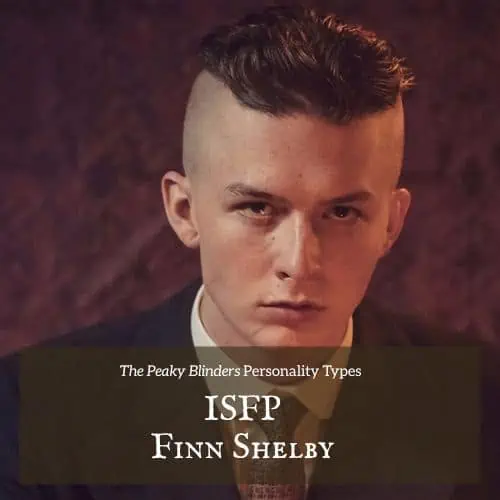
I really liked Finn Shelby during the first four seasons of Peaky Blinders. We can see that young Finn wants to stay true to himself, to not become like everyone else. He has a moral compass and a sense of empathy for people. Even if his solutions aren’t always healthy (giving “Tokyo” to his older brother Arthur) young Finn comes from a place of conviction and consideration. He’s a gentler Shelby; one that his big sister, Ada, hopes will stay that way.
Unfortunately, Finn also struggles with some of the unhealthy qualities of Sensing-Perceivers, albeit taken to an extreme in such a gritty show. As the series progresses we see him become more and more impulsive, hedonistic, and reckless. He eventually puts the Shelby company in jeopardy with his inability to connect the dots that he’s trusting the wrong person.
But, all in all, Finn’s ISFP qualities are still evident. He lives in the present moment and uses what he knows to make decisions based on his personal values. Given a different set of life circumstances, I think Finn could have been a much more inspirational character.
Oswald Mosley – ENTJ
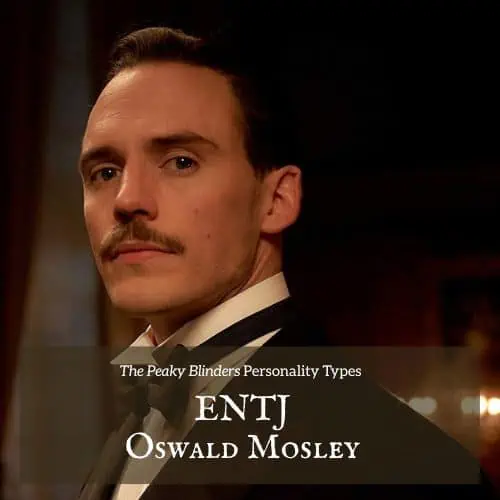
“Mr Shelby, I do have plans. I will have need of men like you. Except of course, there is no other man like you. You, in particular, I need. But please, don’t imagine I would trouble myself with turf wars. You have many enemies. Shuffle the pack and pick another card.” – Oswald Mosley
Oswald Mosley is a cunning and manipulative political leader who wants to get Tommy under his thumb. He is a classic example of a villainous ENTJ; not a healthy and good ENTJ. While he showcases the organized, strategic, visionary nature of the ENTJ he also has little to no conscience and uses people only for his end-goals. Like Tommy, Mosley has no issue taking risks if his intuition is guiding them. Yet he lacks even Tommy’s moral compass (I know, Tommy makes some morally murky decisions) and uses peoples’ emotions to further his own agenda – even if it means weakening Tommy’s family business.
Like many ENTJs, Mosley can be a little too sure of himself. This leads him to make some miscalculated moves, often believing that he can outsmart the Peaky Blinders without realizing just how deep their ties go. While he has a knack for coming up with innovative plans and pushing his vision forward, his lack of moral boundaries make him a scary character to behold.
Linda Shelby – ISFJ
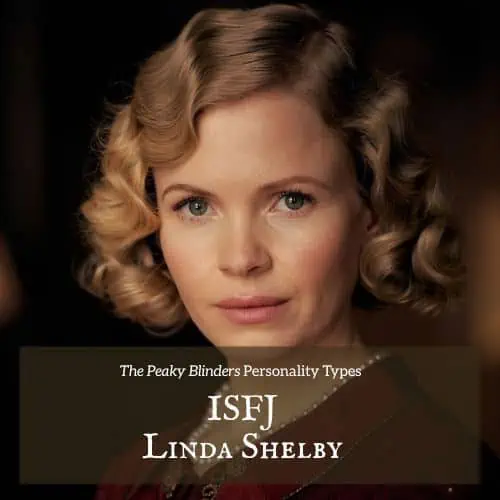
“It’s not me that’s doing the gambling. I’m just taking the bets.” – Linda Shelby
I found it interesting when I was researching Linda Shelby’s character how much vitriol and hatred people had for her. While yes, Linda, can be snobbish and gets in the way of the Peaky Blinders plans by “reforming” Arthur, I personally think he needed some reforming. Arthur was out of control, dangerously addicted to drugs, and deeply violent even against the innocent. I think as viewers of Peaky Blinders we care about the gang and want the best for them, even when they turn out to make reprehensible choices. When Linda gets in the way, she’s “annoying” even if she is ultimately caring for Arthur’s good. Yes, she can be controlling, manipulative, and proud (and yes, I did find her a bit annoying). But I did find it funny how much people hated her but could overlook the more grievous offenses of other characters.
Anyway, my personal views aside, I think Linda Shelby is a detail-oriented, pragmatic ISFJ. She’s driven by her values and wants to create a stable, simpler life for her family. Aware of details that Arthur tends to overlook, she tries to manage Arthur’s affairs and impresses Tommy (even though she annoys him) when she re-negotiates Arthur’s pay during Tommy’s “last” job for him. She is devoted to her family and will go to great lengths to protect them – even if they don’t always appreciate it. Like many Feeling-Judging types, Linda wants to improve the world in some way and help others. Whether she’s “shepherding” Arthur or planning a life of community service, Linda lives by values that she hopes to enforce in a meaningful way.
Freddie Thorne – ENFP
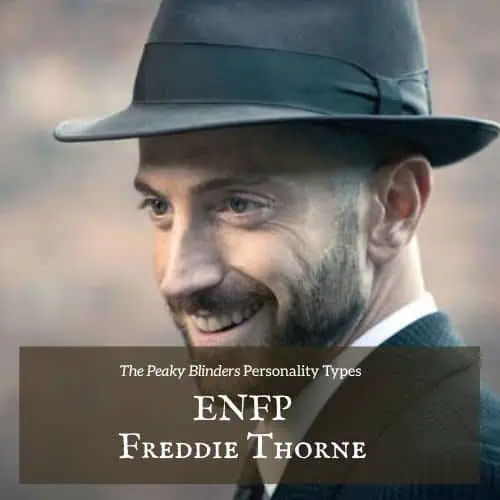
“Do they sit at home, comfortable, with a full belly? While you scrape to find enough to put shoes on your children’s feet! And what is the reward they offer you for your sacrifices made? A cut in your wages! That is your reward!” – Freddie Thorne
Idealistic and ambitious, Freddie Thorne is a communist agitator who is bent on fighting for the welfare of his brothers and countrymen who fought in the war. Idealistic and driven, he has a natural taste for Marxist theory and is well-versed in economics and uses this knowledge to be a convincing speaker. As an ENFP, Freddie knows how to get peoples’ energy high and their motivation sparked. He’s a visionary who wants to bring people on board to create what is, in his mind, a better and fairer future. Although he lacks the long-term strategic nature of Tommy Shelby, and often gets in his way through sheer stubbornness, his conviction, drive, and passion for his cause are inspiring and attractive to Tommy’s sister, Ada.
Aberama Gold – ESTP or ENTP
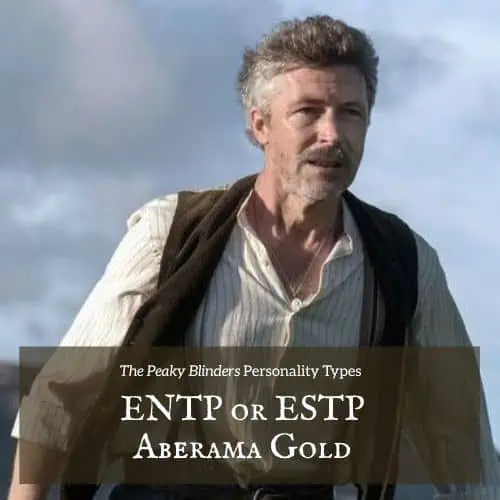
“Everything is for sale. Everything.” – Aberama Gold
We don’t see enough of Aberama Gold to make a clear vote for Sensing or Intuition on his part. However, we can tell that he’s someone who is adaptable, flexible, and quick-witted. He knows how to have the tactical advantage against his enemies, which has given him a reputation as a cunning and dangerous gang leader. He’s a classic example of the ESTP/ENTP; not afraid of taking risks, quickly spotting opportunities, and thinking on his feet when things don’t go according to plan.
Johnny Dogs – ESFJ
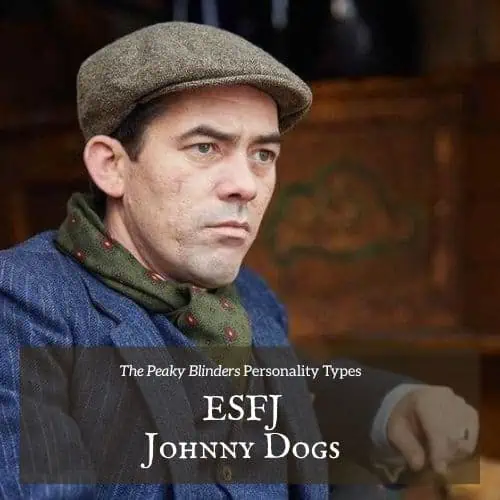
Good-natured and dependable, Johnny Dogs brings a lot of humor and Gypsy tradition into the Peaky Blinders series. Like most ESFJs, he is good with people and blessed with an affability and friendliness that puts others at ease. He also values his Gypsy traditions, and is relied upon by Thomas to serve as a helping hand as well as a link to his ancestry and heritage. He provides the gang with an unconventional yet often sensible perspective on life, and keeps a level head even when given tough jobs.
Luca Changretta – ISTP
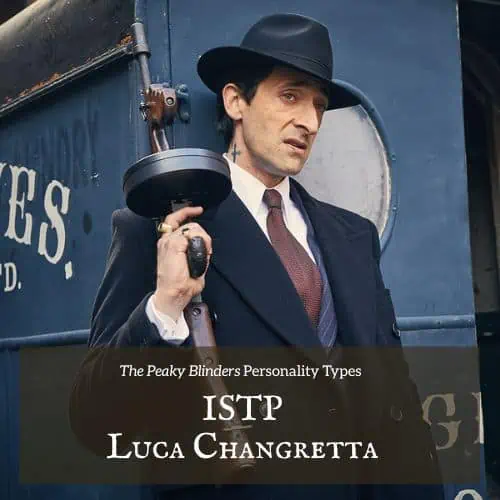
“You people have traditions of honour. As do we. Instead of sendin’ you a black hand, I coulda had you killed in the night, without you knowin’ why… but I WANT you to know why. And I wanna suggest to you that we fight this vendetta with honour.” – Luca Changretta
This Italian mobster is one of the only people who knows how to play Tommy Shelby at his own game. Calculated and focused, Luca has a calm yet directional energy that ISTPs are known for. He rapidly analyzes situations and comes up with tactics and strategies to get the outcome he wants. At the same time, he honors the process of beating Tommy and doesn’t just take him down when he has the first opportunity to. He has a system for how he wants things done and the focus is more on the journey than the end goal (common of Thinking-Perceivers versus Thinking-Judgers). He’d rather have a perfect and impactful course of action than just get the result as quickly as he possibly can. Sensing-Perceivers want to make an impact, and Luca does this not only with his battle style but his fashion sense as well. He stands out from the drabness of Birmingham with his stylish cuts, tailored clothing, and cool attitude. All this said, Luca is not someone who’s type profile is especially clear. I’d be open to arguments for other types; but this is my best guess based on the information we’re given in the show.
Charlie Strong – ISTP
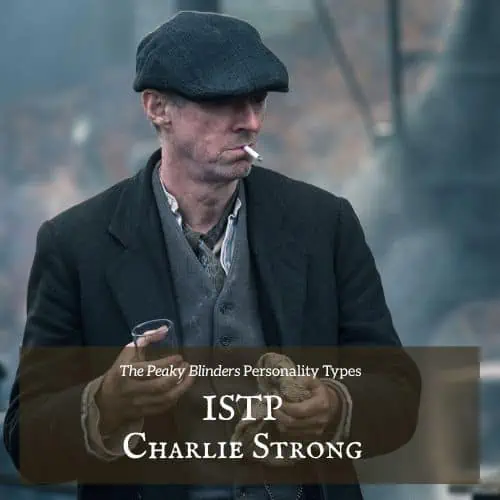
Charlie Strong is someone who likes to live life on his own terms. He’s annoyed when the Peaky Blinders start pursuing legitimate business methods rather than their usual gambling and illegal activities, and he’s quick to remind Tommy that “I didn’t sign up for all this”. His ISTP type preferences can be hinted at in his natural rebelliousness towards rules, as well as his independent nature. Yet even with his cranky exterior, he’s one of the most loyal people the Shelby’s know and is clever when dealing with crises’ or possible threats. He’s a great asset to the team, and can always be counted on for some funny but accurate commentary.
Characters I couldn’t get a profile on:
Lizzie Stark was one of my favorite characters in the series, but one I had a very difficult time typing. I believe she is an introvert and a sensor, but the other two preferences were too unclear for me to say much more than that.
Gina Gray is (I believe) a kind of narcissist, alcoholic, and drug user. Because that shapes so much of who she is on the show, I was hesitant to profile her and really didn’t know enough about her to be able to get an accurate read on who she is at her core.
Esme Shelby is a strong-willed, fiery woman who speaks her mind freely. That said, I was torn between two types for her. I’d say she’s either an ESTJ or an ENFP, which sound like very different personality types, but they actually share the same cognitive functions, just in a different order and strength.
Ben Younger is a character that seemed interesting to me, but again, not enough was shown to make a clear assessment. I would guess he is an INFJ or ISFJ personality type; but again, that’s just a guess and more information would be needed to be especially clear.
What Are Your Thoughts?
Do you agree with these typings? Do you have any insights or perspectives to share? Let us know in the comments!
Discover more about your personality type in our eBooks, Discovering You: Unlocking the Power of Personality Type, The INFJ – Understanding the Mystic, The INTJ – Understanding the Strategist, and The INFP – Understanding the Dreamer. You can also connect with me via Facebook, Instagram, or Twitter!












I did not see INFJ (which is what I am) but there are two ISTPs. Strange.
Hi Alexis! When people create TV shows they usually aren’t thinking of including 16 Myers-Briggs personality types. They usually just write characters they like, or they take characters from history. Because of that, we can’t always include each of the 16 types in an article. In this case, Peaky Blinders has a lot of Sensing-Perceivers and far less Intuitive-Feelers. At the beginning of the article I mentioned that certain personality types aren’t represented in the series, but I know most people kind of skip past the intro sections.
Was looking for that as well…. but we are rare
So i read the whole thimg to find oit you couldnt figure out who was an INFJ … 😵😠
If you read the beginning of the article I mentioned that not each of the 16 personality types were represented in the show. I would have loved to have seen an INFJ in Peaky Blinders, but I couldn’t find anyone who showed clear preferences for that. If you have a different opinion be sure to let us know!
The INFJ is rare so it may be hard to spot one. I’m guessing it would have been one of the Irish-Romani, perhaps Birdie Boswell, Polly’s mother. 🤔
Thomas is INTJ analyze character once again Ni and Fi functions
Where’s INTP ?
I don’t think this is the right analysis. Thomas isn’t extravert)